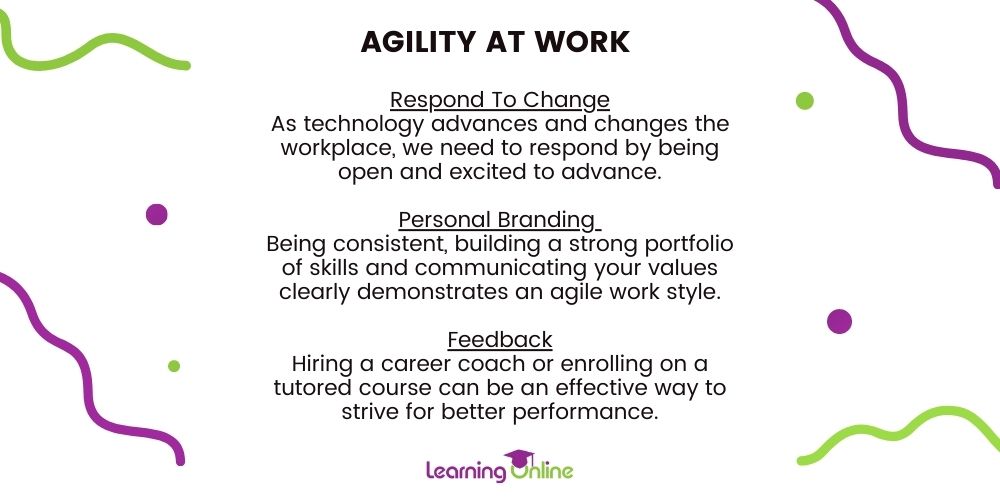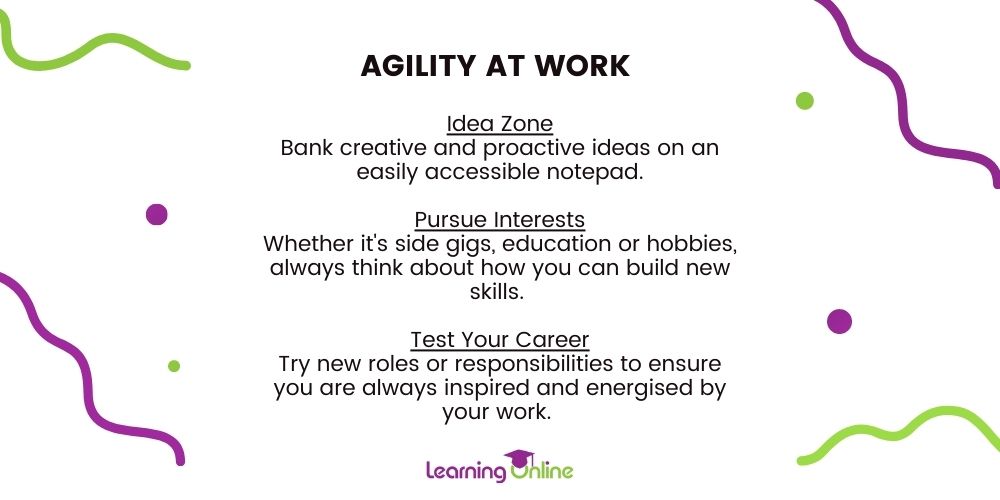When we think about agility, the first association we might make is of sports. And it’s true that being skilled at changing direction and speed is essential to being an effective athlete. Agility combines speed, balance, strength and body control in a single movement; it’s one of the first abilities you’d focus on if you wanted to improve your performance at the gym or a team sport. For many, it’s considered the secret to unlocking their fitness potential.
Taking a closer look at agility, however, it’s not limited to the physical. Having an agile mind or the ability to absorb and apply the information we learn can benefit multiple areas of our life. If we have better concentration and focus, we are able to react more quickly to unexpected events and situations and feel more confident in our approach while doing so.
But why is agility an essential skill for remaining competitive at work? Well, just as you would enhance your sporting ability by refining your agility, you can become more dynamic and inspired in the workplace by developing your learning agility.
Here’s how mental agility can help bolster your career prospects and ensure you remain a standout candidate in any industry.
In a constantly changing world, being comfortable with adjusting and adapting to unexpected events is essential to career success. As with the overnight switch from unrestricted freedom to lockdown in the pandemic, among other changes we had to adopt, this has shown us that life can throw curveballs our way at any moment.
Our willingness to shift in line with these changes and do what’s necessary requires drawing on our stores of agility. Our adaptability in the workplace will be the measure of our success and guide us through life’s transitions and the future of work trends with markedly more ease and notably less struggle.
Career agility: what it takes to be competitive
Career agility optimises growth and creativity; by being open-minded with our chosen career path, we stay receptive to possibilities.
But what defines a nimble employee or flexible entrepreneur? Author Marti Konstant writes about the new kind of career agility in a post-covid world. Looking at our career as a series of projects, she believes there are several principles that guide career agility.
- The key to remaining agile is being open to receiving honest feedback, so you can make better decisions and acknowledge your strengths while working on any weaknesses.
- Networking is also essential – especially for discovering hidden opportunities in companies.
- Taking stock – looking at whether your job is relevant, and how you can up- or re-skill to remain competitive, can help to ensure you’re building a career that adapts to the needs of your employer and the wider economic climate.
Ultimately, to be agile in our career is to anticipate what’s ahead, monitor trends, and understand where your role fits into or contributes to the bigger picture.
In the workplace there are several ways to track our agility and remain on top of these changes.
- Idea zone – this is a document or notepad to be kept open on our desktop or desk at all times. It’s used to quickly take note or jot down ideas on how your performance can be optimised. In this way, there’s a wealth of creativity banked for when we need it. We can draw on these ideas to progress our work agility and/or introduce them to managers during performance reviews and one-on-ones.
- Pursue side gigs, education or hobbies – these create pathways for our inspiration, help foster further creativity, extra learning, income or new job opportunities. For example, My Learning Online offers courses you can fit around your current work schedule, with 24/7 access to materials and tutors available 6 days per week to support your efforts. You can build new skills or learn more about your hobbies while growing your agility in the workplace!
- Test your career – by giving yourself permission to explore other avenues or roles at your place of work, you may find alternative positions that are a greater fit for your skills or you generally feel more inspired and energised by.
- Change response – how we respond to changes is critical. As technology advances and changes roles/creates new ones, we need to respond to change by being open and making changes to our job where necessary to keep up.
- Personal branding – who we are, and how we present ourselves to the world matters more than ever. By being consistent, building a portfolio of skills and communicating our values clearly, we are building our own personal brand that we can leverage during any changes in our careers.
- Feedback – no one is an island. We need mentors, peers and the valuable feedback they provide. Hiring a career coach can be an effective way to integrate constructive criticism and improve your performance.
- See your career as a series of projects – by doing this, you can look at day to day work as a series of fresh starts or projects that you are learning different skills from, each one building your own personal, competitive, relevant portfolio.
Mental agility is how well our mind adapts to changes in external circumstances. It’s the ability of individuals to think, learn and quickly absorb new information, systems and processes. In research, those with mental agility – also known as psychological flexibility – were shown to be less depressed, anxious or stressed, and more likely to feel a general sense of well-being due to how they approach life’s situations and events.
As people, we all perceive situations differently. But by remaining open, curious, and explaining our point of view while listening to that of others, we adopt a mentally agile state. What’s more, mental agility in the workplace is crucial as miscommunication or a lack of information can grow into bigger issues, if left unresolved.
In answer to the question, how do we design a future of work that works for all? The answer is by promoting the importance of not just technical skill, but mental agility too. In fact, this trend is already emerging, with numerous careers in demand in New Zealand today that require agile learning skills.
As we mentioned, pursuing a hobby or area of study outside your current role can help develop your mental agility, and you can be confident that we have the perfect short course for you.
If you’ve been on the fence about taking this next step in your career journey, why not speak to one of our consultants to learn more? Online learning offers flexibility and self-paced study that can be adapted to your circumstances and there is also a range of funding options available.
Don’t hesitate a moment longer – discover your agility and make this move today!


